CTMM: Bài nói chuyện ngày 23-07-2020 của Bộ Trưởng Ngoại Giao Hoa Kỳ Mike Pompeo đánh dấu chính thức công khai sự hùy bỏ chính sách Constructive Engagement với Trung Quốc. Đây là một bước ngoặt lớn về tình hình thế giới, không khác cách đây 50 năm có sự thay đổi chính sách từ TT Nixon, bắt tay với Trung Cộng, để cô lập Liên Xô. Xin gửi đế Quý Độc Giả bản dịch của CTMM. Nguyên bản tiếng Anh ở cuối bài.
Một bài phát biểu dài nhưng cực kỳ quan trọng và nên đọc.
***
Trung Cộng và Tương Lai Của Thế Giới Tự Do
Bài phát biểu của Tổng trưởng Ngoại giao Hoa Kỳ Pompeo tại thư viện tổng thống Richard Nixon, Ngày 23 tháng 7, 2020
—
Cảm ơn. Cám ơn tất cả. Cảm ơn thống đốc (Wilson) cho lời giới thiệu quá mức. Đúng vậy khi mới bước vào phòng tập thể dục và nghe thấy tên gọi “Pompeo là nghe thấy tiếng thì thầm. Vì tôi có người em, tên Mark, là một tay chơi basketball rất rất là giỏi .
Xin một tràng pháo tay cho cho Đội Kèn Blue Eagles và cô Kayla Highsmith đã hát bài quốc ca tuyệt vời.
Cũng xin cảm ơn mục sư Laurie cho lời cầu nguyện rất là cảm động và tôi muốn cảm ơn ông Hugh Hewitt và Nixon Foundation cho lời mời nói chuyện tại nơi quan trọng này. Được nghe hát bởi Không quân, được giới thiệu bởi một Thủy quân lục chiến, và đã để cho tôi, một người lính Bộ binh được hiện diện trước nhà của một lính Hải quân. Quá tốt.
Thật là một vinh dự được đứng ở đây tại Yorba Linda, nơi cha của ông Nixon đã xây căn nhà, và là nơi ông đã sinh ra và lớn lên.
Tôi xin gửi lời cảm ơn đến hội đồng và nhân viên của Nixon Center đã cho tôi và và nhóm của tôi có cơ hội nói chuyện như hôm nay.
Chúng ta may mắn để có thành phần cử toạ ngày hôm nay những người rất là đặc biệt, như Chris Nixon, mà tôi được biết. Tôi cũng muốn cảm ơn ơn Tricia Nixon và Julie Nixon Eisenhower đã hỗ trợ buổi này.
Tôi muốn nhắc đến một vài nhân vật bất đồng chính kiến Trung Hoa rất can đảm có mặt ngày hôm nay và đã đi từ rất xa.
Và với tất cả cả quý quan khách xin được gửi lời cảm ơn đã có mặt ngày hôm nay. Với quý vị đang ngồi trong lều chắc cũng đã phải trả thêm tiền. Và các bạn đang nghe live cảm ơn đã vào mạng.
Và cuối cùng, đúng như thống đốc đã nói tôi đã sinh ra tại Santa Ana cách đây không xa. Chị của tôi và Chồng cũng có mặt trong cử tọa ngày hôm nay. Cảm ơn tất cả đã đến. Tôi chắc anh chị không bao giờ nghĩ rằng tôi sẽ được đứng ở đây.
Phần trình bày của tôi là phần thứ tư trong một loạt phát biểu liên quan đến Trung Quốc mà tôi đã yêu cầu Cố vấn an ninh quốc gia Robert O’ Brien, Giám đốc FBI Chris Wray, và Bộ trưởng Bộ Tư Pháp William Barr cùng trình bày với tôi.
Chúng tôi có một mục đích rất rõ, một sứ mạng thực sự. Đó là giải thích nhiều khía cạnh khác nhau trong tương quan Hoa Kỳ và Trung Quốc, sự bất quân bình rất lớn đã bồi đắp nhiều thập niên, và mưu đồ bá quyền của Đảng Cộng sản Trung Quốc.
Mục đích của chúng tôi là làm rõ sự đe dọa đối với Hoa Kỳ mà chính sách về Trung Quốc của Tổng thống Trump nhắm làm rõ và chiến lược đặt ra để đạt được sự tự do này.
Đại sứ O’Brien đã nói về ý thức hệ. Giám đốc FBI Wray nói về gián điệp. Bộ trưởng tư pháp Barr nói về vấn đề kinh tế. Và bây giờ mục tiêu của tôi là gom chung lại cho người dân Hoa Kỳ và diễn giải chi tiết sự đe dọa Trung Quốc như thế nào đối với nền kinh tế của chúng ta, đối với sự tự do của chúng ta, và thật ra là đối với tương lai của những nền dân chủ tự do toàn thế giới.
Năm tới đánh dấu một nửa thế kỷ từ khi Tiến sĩ Kissinger bí mật sang Trung Hoa, và 50 năm kỷ niệm chuyến công du của tổng thống Nixon cũng không còn xa vào năm 2022.
Thế giới khi đó đã rất khác.
Chúng ta tưởng tượng sự giao hảo (engagement) với Trung Quốc sẽ đem lại một tương lai đầy hứa hẹn về hợp tác và hữu nghị.
Nhưng ngày hôm nay, hôm nay tất cả chúng ta đều còn đeo khẩu trang và đếm nhìn những xác chết vì bệnh dịch bởi vì Đảng Cộng sản Trung Quốc không thực hiện những lời hứa với thế giới. Chúng ta vẫn còn đọc mỗi buổi sáng những tựa tin đàn áp tại Hồng Kông và Xinjiang.
Chúng ta vẫn đang thấy tràn ngập những thống kê về lạm dụng thương mại Trung Quốc ảnh hưởng đến việc làm của người Mỹ, và gây tổn hại đến nền kinh tế khắp nước Mỹ, kể cả tại miền Nam California này. Và chúng ta đang chứng kiến một quân đội Trung Quốc càng ngày càng mạnh hơn và thật ra càng đe dọa hơn.
Tôi sẽ nêu lên những câu hỏi vang trong tim óc của người Hoa Kỳ từ California cho đến tiểu bang quê nhà của tôi tại Kansas và xa hơn nữa, đó là:
Người dân Hoa Kỳ phải chứng tỏ gì thêm nữa sau 50 năm giao hảo với Trung Quốc?
Luận thuyết mà những lãnh đạo chúng ta đã đề xướng là Trung Quốc sẽ biến thái dần đến tự do và dân chủ, có chứng tỏ đúng hay không?
Đây có phải là kiểu định nghĩa của Trung Quốc đôi bên đồng lợi hay không?
Và then chốt trở lại, từ nhãn quan của Bộ trưởng Bộ Ngoại Giao, Hoa Kỳ có an toàn hơn không? Chúng ta có cơ hội khá hơn về một nền hòa bình cho chúng ta và cho các thế hệ kế tiếp hay không?
Hãy nhìn, chúng ta phải công nhận một sự thật khó khăn. Chúng ta phải công nhận một sự thật khó khăn sẽ đưa dẫn chúng ta trong những năm và những thập niên sắp tới, đó là nếu chúng ta muốn có một thế kỷ 21 tự do, và không phải là thế kỷ Trung Quốc mà Tập Cận Bình mơ ước, thì khuôn thước cũ của giao hảo mù quáng đối với Trung Quốc đơn giản sẽ không thực hiện được điều này. Chúng ta không thể tiếp tục nó. Chúng ta không thể quay trở lại nó.
Như tổng thống Trump đã nói rõ, chúng ta cần một chiến lược bảo vệ nền kinh tế Hoa Kỳ, và thực ra bảo vệ cách sống của chúng ta. Thế giới tự do phải chiến thắng kiểu độc tài mới này.
Và trước khi tôi có vẻ vội vã kéo sụp di sản của tổng thống Nixon, tôi muốn nói rõ rằng những điều mà ông đã làm là những điều ông tin tưởng tốt đẹp nhất cho cho nhân dân Hoa Kỳ vào lúc đó, và ông đã có nhiều triển vọng sẽ đúng.
Ông là nhà nghiên cứu sâu sắc về Trung Hoa, một người chiến đấu dũng mãnh thời chiến tranh lạnh, và ngưỡng mộ người dân Trung Hoa, cũng như, theo tôi, tất cả chúng ta đều thế.
Ông xứng đáng được ghi nhận cho sự nhận định rằng Trung Quốc quá quan trọng để có thể bỏ qua, ngay cả khi quốc gia này bị suy yếu vì sự tàn bạo cộng sản chính nó tự gây ra.
Năm 1967 trong một bài nổi tiếng của tập san Foreign Affairs, ông Nixon đã giải thích chiến lược tương lai của ông. Đây là điều ông viết:
Ông viết “Về lâu dài, chúng ta đơn giản không thể bỏ Trung Hoa mãi mãi nằm bên ngoài vòng đại gia đình của các quốc gia… thế giới không thể an toàn cho đến khi Trung Hoa thay đổi. Do đó mục tiêu của chúng ta nhắm đến, ở mức có thể được, chúng ta phải ảnh hưởng những biến cố, mục tiêu của chúng ta sẽ phải là thúc đẩy những thay đổi”
Và tôi nghĩ rằng đó là là câu then chốt trong toàn bài: “thúc đẩy những thay đổi”.
Và với chuyến đi lịch sử đến Bắc Kinh Tổng thống Nixon đã đã mở màn cho chiến lược giao hảo. Ông đã cao cả tìm kiếm một thế giới tự do hơn an toàn hơn, và ông hy vọng Đảng Cộng sản Trung Quốc sẽ đáp trả sự quyết tâm này.
Thời gian trôi qua những nhà chính sách Hoa Kỳ ngày càng coi như rằng nếu Trung Hoa trở nên giàu có hơn nó sẽ mở cửa ra, nó sẽ trở nên tự do hơn cho trong nước, và sẽ giảm là mối đe dọa đối với bên ngoài, và nó sẽ thân thiện hơn. Tất cả đều có vẻ như không thể nào khác hơn được
Nhưng thời của những điều không thể khác được đã qua. Cách giao hảo mà chúng ta theo đuổi đã không đem lại kiểu thay đổi bên trong Trung Hoa mà tổng thống Nixon đã mong sẽ thúc đẩy.
Sự thật là, các chính sách của chúng ta, và của những quốc gia tự do khác, đã vực dậy nền kinh tế suy sụp của Trung Hoa, chỉ để thấy Bắc Kinh quay lại cắn những bàn tay quốc tế đã nuôi nó.
Chúng ta mở rộng vòng tay cho các công dân Trung Hoa, chỉ để thấy Đảng Cộng sản Trung Quốc khai thác xã hội tự do và rộng mở của chúng ta. Trung Quốc gửi những kẻ tuyên truyền vào những buổi họp báo, vào những trung tâm nghiên cứu, vào trường học, vào đại học, và ngay cả vào những buổi họp của phụ huynh học sinh.
Chúng ta bỏ ra ngoài lề những người bạn Đài Loan, mà sau này nở ra thành một nền dân chủ vững mạnh.
Chúng ta cho Đảng Cộng sản Trung Quốc và chế độ của nó những đối xử kinh tế đặc biệt chỉ để thấy Đảng Cộng sản Trung Quốc đòi hỏi một sự thinh lặng đối với những vi phạm nhân quyền như một cái giá để cho những công ty Tây Phương vào thị trường Trung Quốc.
Đại sứ O’Brien có nêu lên vài ví dụ hôm trước: Marriott, American Airline, Delta, United
đều tháo gỡ những gì nhắc đến Đài Loan khỏi trang nhà của họ, chỉ để không làm mất lòng Bắc Kinh.
Holywood, không cách xa gì chỗ này, nơi trung tâm của tự do sáng tạo Hoa Kỳ và là trọng tài tự nhận về công lý xã hội, đã tự kiểm duyệt ngay cả những gì nhắc đến chỉ hơi bất lợi cho Trung Quốc.
Sự nhượng bộ của các công ty đối với Đảng Cộng sản Trung Quốc cũng xảy ra khặ́p nơi trên thế giới.
Và sự thần phục này đã được đáp trả ra sao? Sự bợ đỡ này có được đền bù không? Tôi xin trích một câu từ bài diễn văn của Bộ trưởng Tư pháp Barr. Trong bài diễn văn tuần vừa qua ông nói : “Tham vọng cuối cùng của những kẻ cai trị Trung Quốc không phải là để giao thương với Hoa Kỳ. Nó là để cướp bóc Hoa Kỳ”
Trung Quốc cướp đoạt những bí mật thương mại và và tài sản trí tuệ đáng giá của chúng ta, ảnh hưởng hàng triệu việc làm khắp mọi nơi trên nước Mỹ.
Nó rút mất chuỗi cung ứng khỏi nước Mỹ và sau đó bỏ trở lại một vật mọn làm từ lao động nô lệ.
Nó làm các đường vận chuyển hàng hải then chốt cho thương mại quốc tế bớt sự an toàn.
Tổng thống Nixon đã có lần nói, ông sợ rằng ông đã tạo ra một con quái vật khi mở thế giới ra cho Đảng Cộng sản Trung Quốc. Đây chính là lúc đó.
Bây giờ những người chân thành có thể tranh luận tại sao những quốc gia tự do lại để những điều xấu đã xảy ra trong suốt những năm này. Có lẽ chúng ta đã ngây thơ về chủng loại độc hại Cộng sản của Trung Quốc, hoặc huênh hoang sau chiến thắng Chiến Tranh Lạnh, hoặc là tư bản hèn nhát, hoặc bị qua mặt bởi kiểu nói “ trỗi dậy hòa bình” của Bắc Kinh.
Vì bất cứ lý do gì, bất cứ lý do gì, ngày nay Trung Quốc ngày càng độc tài trong nước, và ngày càng hung hãn thù nghịch với tự do ở những nơi khác.
Và Tổng thống Trump đã nói: Đủ rồi.
Tôi không nghĩ rằng có nhiều người ở phía này hay là phía kia phản bác những sự kiện tôi vừa nêu ra ngày hôm nay. Nhưng ngay cả bây giờ cũng vẫn có vài người đòi hỏi rằng chúng ta duy trì tiếp khung hình Đối thoại chỉ để Đối thoại.
Nói cho rõ, chúng ta vẫn duy trì những cuộc nói chuyện. Nhưng câu chuyện đã khác ngày hôm nay. Tôi có đến Honolulu vài tuần trước đây để gặp Yang Jiechi.
Vẫn là chuyện cũ như xưa. Rất nhiều lời nhưng hoàn toàn không có một đáp ứng để thay đổi ứng xử nào.
Những hứa hẹn của Yang, giống như rất nhiều của Đảng Cộng sản Trung Quốc trước đó, hoàn toàn trống rỗng. Những sự chờ đợi từ ông ta, tôi tóm gọn, là tôi sẽ nhượng bộ những đòi hỏi của họ, bởi vì thực ra đây chính là điều mà những chính quyền trước đây đã làm. Nhưng tôi thì không, và tổng thống Trump cũng sẽ không.
Như đại sứ O’Brien giải thích rất rõ, chúng ta phải nhớ rằng chế độ Đảng Cộng sản Trung Quốc là một chế độ Marxist- Leninist. Tổng bí thư Tập Cận Bình là người tin tuyệt đối vào một ý thức hệ toàn trị đã phá sản.
Chính ý thức hệ này đã tạo ra ý muốn dài một thập niên về sự bá quyền toàn cầu của chủ nghĩa cộng sản Trung Quốc. Hoa Kỳ không thể tiếp tục làm ngơ những sự khác biệt căn bản về chính trị và ý thức hệ giữa hai quốc gia cũng như Đảng Cộng sản Trung Quốc không bao giờ giờ làm ngơ về điều này.
Kinh nghiệm của tôi tại Ủy ban Tình báo Hạ viện và sau đó là giám đốc Cơ quan Tình báo Trung ương và bây giờ 2 năm trong vị trí Bộ trưởng Bộ Ngoại giao của Hoa Kỳ đã cho tôi hiểu điểm then chốt này: Cách duy nhất để thực sự thay đổi Cộng Sản Trung Hoa là hành động không dựa trên căn bản những gì lãnh đạo Trung Quốc nói mà trên cách họ ứng xử ra sao. Và quý vị có thể thấy chính sách của Hoa Kỳ đi theo với sự kết luận này. Tổng thống Reagan đã nói rằng ông giao tiếp với Liên Xô trên căn bản “ tin nhưng phối kiểm”. Với Đảng Cộng sản Trung Quốc tôi nói rằng chúng ta phải “không tin và phối kiểm”.
Chúng ta phải khởi đầu bằng cách thay đổi điều dân chúng và đồng bạn cảm nhận về Đảng Cộng sản Trung Quốc. Chúng ta phải nói sự thật. Chúng ta không thể coi sự tái sinh của Trung Quốc như một quốc gia bình thường như mọi quốc gia khác.
Chúng ta biết rằng giao thương với Trung Quốc không phải là giao thương với một quốc gia bình thường tuân thủ luật lệ. Bắc Kinh đe dọa các thỏa thuận quốc tế, coi những thỏa thuận quốc tế chỉ là các đề nghị, và là cách dẫn đển thống trị toàn cầu.
Nhưng qua sự bền bỉ đòi những điều khoản công bằng, mà người đại diện thương mại của chúng ta đã làm, khi hoàn tất giai đoạn 1 của thỏa thuận về thương mại, chúng ta có thể ép buộc Trung Quốc phải tính toán lại sự trộm cắp tài sản trí tuệ và những chính sách gây thiệt hại cho nhân công Hoa Kỳ.
Chúng ta cũng biết làm ăn với một công ty hỗ trợ bởi Đảng Cộng sản Trung Quốc không phải giống như làm ăn với thí dụ một công ty Canada. Họ không chịu trách nhiệm với một hội đồng quản trị độc lập và rất nhiều trong số đó là công ty quốc doanh nên không có nhu cầu theo đuổi lợi nhuận.
Một ví dụ rất rõ là công ty Hoa Vi. Chúng ta chấm dứt việc giả bộ Hoa Vi là một công ty viễn thông vô tội, chỉ nhằm cung cấp phương tiện cho ta liên lạc với nhau. Chúng ta phải gọi nó với đúng danh xưng, một sự đe dọa an ninh quốc gia thực sự. Và chúng ta đã có biện pháp tương xứng phù hợp.
Chúng ta cũng biết rằng nếu những công ty của chúng ta đầu tư tại Trung Quốc họ có thể vô tình hay hữu ý, hỗ trợ cho sự vi phạm nhân quyền trầm trọng của Đảng cộng sản.
Bộ Tài Chánh và Thương Mại của chúng ta do đó đã chế tài và lên sổ đen những lãnh đạo Trung Quốc và những cơ quan đã gây hại và xâm phạm quyền căn bản con người mọi nơi trên thế giới. Nhiều cơ quan đã phối hợp để cố vấn các chủ tịch công ty được biết chuỗi cung ứng của họ vận hành ra sao bên trong Trung Quốc.
Chúng ta cũng biết rằng không phải tất cả mọi sinh viên và nhân công Trung Quốc là những sinh viên hay công nhân bình thường đến đây để làm có tiền và thu góp thêm kiến thức. Trong số họ có rất nhiều người đến đây để đánh cắp tài sản trí tuệ và đem về quốc gia của họ. Bộ Tư Pháp và các cơ quan khác đang theo đuổi mạnh mẽ những hình phạt cho loại tội phạm này.
Chúng ta biết Quân đội Nhân dân Giải phóng Trung Quốc không phải là một đội quân bình thường. Mục tiêu của họ là bảo vệ sự cầm quyền tuyệt đối của đầu não Đảng Cộng sản Trung Quốc và cho sự bành trướng của đế quốc Trung Quốc, không phải để bảo vệ người dân Trung Hoa.
Vì thế Bộ Quốc Phòng của chúng ta đã đẩy mạnh nỗ lực có những hoạt động tự do hàng hải ngoài và dọc suốt biển Đông và Nam Trung Hoa, cũng như trong Eo biển Đài Loan. Và chúng ta đã tạo ra Lực lượng Không gian để đe chặn Trung Quốc gây hấn trên tuyến trận này.
Thực ra chúng ta đã xây dựng một hệ thống chính sách tại bộ Ngoại giao để giao tiếp với Trung Quốc, đẩy mạnh mục tiêu của Tổng thống Trump cho sự công bằng và tương giao đồng lợi, tái lập sự bất quân bình đã trải dài nhiều thập niên.
Tuần này chúng ta tuyên bố đóng cửa Tòa Lãnh sự Trung Quốc tại Houston vì đó là ổ gián điệp và trộm cắp tài sản trí tuệ. (vỗ tay)
Hai tuần trước, chúng ta đảo ngược 8 năm đưa má (cho tát) đối với (sự vi phạm) luật lệ quốc tế tại biển Nam Trung Hoa.
Chúng ta kêu gọi Trung Quốc tuân thủ khả năng nguyên tử đối với thực tế chiến lược của thời đại.
Và bộ Ngoại giao, ở mọi cấp bộ, ở mọi trụ sở trên thế giới, đã giao tiếp với nhân sự đối tác Trung Quốc đơn giản đòi hỏi sự công bằng và tương giao.
Nhưng phương cách của chúng ta không chỉ đơn thuần là cứng rắn. Cách đó khó mà thực hiện được kết quả chúng ta mong muốn. Chúng ta phải đồng thời tiếp cận và tiếp lực người dân Trung Hoa – một dân tộc yêu chuộng tự do, năng động, hoàn toàn tách bạch với Đảng Cộng sản Trung Quốc.
Điều đó bắt đầu với chính sách ngoại giao gặp con người. (vỗ tay)
Tôi đã gặp những người đàn ông và phụ nữ Trung Hoa đầy tài năng và cần mẫn bất cứ nơi nào tôi đến. Tôi đã gặp những người Duy Ngô Nhĩ và những người thiểu số Kazakhs vượt thoát những trại tập trung ở Xijiang. Tôi đã nói chuyện với những lãnh tụ dân chủ ở Hồng Kông từ Hồng y Zen đến Jimmy Lai. Hai ngày trước đây tại Luân Đôn tôi đã gặp người đấu tranh cho tự do Nathan Law.
Và tháng qua tại văn phòng tôi đã nghe những câu chuyện từ những người sống sót sau vụ Thiên An Môn. Một trong những người đó có mặt ở đây hôm nay. Wang Dan là một sinh viên thủ lĩnh không bao giờ ngừng chiến đấu cho sự tự do cho người dân Trung Hoa. Ông Wang xin ông đứng dậy để mọi người có thể để nhận ra. (vỗ tay)
Cũng có mặt ở đây ngày hôm nay là cha đẻ của phong trào dân chủ Trung Hoa, ông Wei Jingsheng. Ông ta đã bị giam nhiều năm trong trại lao động khổ sai vì tranh đấu. Ông Wei xin mời ông đứng lên. (vỗ tay)
Tôi lớn lên và và phục vụ trong bộ binh suốt thời gian chiến tranh lạnh và nếu có một điều tôi học hỏi được đó là là cộng sản luôn luôn dối trá. Sự dối trá lớn nhất mà mà họ nói, đó là nghĩ rằng họ nói thay mặt cho 1 tỷ 400 triệu người dân bị theo dõi, bị đàn áp, bị đe dọa nếu lên tiếng.
Hoàn toàn ngược lại. Đảng Cộng sản Trung Quốc sợ ý kiến trung thực của người dân Trung Hoa hơn sợ kẻ thù và họ sợ mất quyền lực kiểm soát.
Thử nghĩ rằng thế giới tốt hơn biết bao, chưa nói đến cho những người dân trong nước Trung Hoa, nếu chúng ta đã có thể nghe được tiếng nói của những bác sĩ tại Vũ Hán và họ được phép báo động về nguy cơ của một loại virus mới.
Đã quá nhiều thập niên lãnh đạo của chúng ta đã làm ngơ, xem thường tiếng nói của những người Trung Hoa bất đồng chính kiến can đảm, báo động về bản chất của chế độ mà chúng ta đang đối điện. Chúng ta không thể tiếp tục làm ngơ nữa. Họ và mọi người đều biết là chúng ta không bao giờ có thể quay về nguyên trạng cũ.
Nhưng thay đổi ứng xử của Đảng Cộng sản Trung Quốc không phải là sứ mạng duy nhất của người dân Trung Hoa. Các quốc gia tự do phải phải tranh đấu để bảo vệ tự do. Đó không phải là điều dễ.
Nhưng tôi có niềm tin là chúng ta chúng ta có thể làm được. Tôi có niềm tin đó vì chúng ta đã làm được điều này trước đây. Chúng ta biết thực hiện ra sao. Tôi có niềm tin bởi vì Đảng Cộng sản Trung Quốc đang lập lại cùng lỗi lầm như Liên Xô đã làm trước đây, tức là bất cần những đồng minh tiềm năng, đánh mất niềm tin của dân trong nước cũng như người bên ngoài, bác bỏ quyền sở hữu tài sản và sự cai trị theo luật.
Tôi có niềm tin. Tôi có niềm tin bởi vì tôi đã nhìn thấy các quốc gia khác đã thức tỉnh và biết rằng chúng ta không thể trở lại quá khứ với cùng cách như đã làm tại Hoa Kỳ. Tôi nghe điều này ở Brussels, từ Sydney, đến Hà Nội.
Và trên hết tôi có niềm tin chúng ta có thể bảo vệ tự do vì sự hấp dẫn dịu dàng của sự tự do chính nó. Hãy nhìn những người dân Hồng Kông chấn động chuẩn bị ly hương khi Đảng Cộng sản Trung Quốc ra tay bóp siết thành phố thân yêu đó. Họ vẫy cờ Hoa Kỳ.
Đúng, có sự khác biệt. Không giống Liên Xô, Trung Quốc gắn sâu vào hệ thống kinh tế toàn cầu. Nhưng Trung Quốc tùy thuộc vào ta hơn là ta tuỳ thuộc vào họ.
Tôi bác bỏ ý niệm là chúng ta đang sống trong thời đại không thể nào khác hơn được, có những bẫy sập đã là định mệnh, và rằng vị trí chúa tể của Đảng Cộng sản Trung Quốc là tương lai. Con đường của chúng ta không tiền định là thất bại vì Hoa Kỳ Đang đi xuống. Như tôi đã nói tại Munich trước đây năm nay, thế giới tự do vẫn đang chiến thắng. Chúng ta chỉ cần tin rằng, biết rằng, và hãnh diện vì điều đó. Mọi người khắp nơi trên thế giới vẫn chỉ muốn đến những xã hội rộng mở. Họ đến đây để học, họ đến đây để làm việc, và họ đến đây để xây dựng lại một đời sống cho gia đình. Họ không làm mọi cách để định cư tại Trung Quốc.
Đã đến lúc. Quá tốt để đứng đây hôm nay. Thời điểm thật hoàn hảo. Đã đến lúc các quốc gia tự do phải hành động. Không phải quốc gia nào cũng làm cùng cách đối với Trung Quốc, và cũng không nên như thế. Mỗi quốc gia sẽ tìm cho mình cách bảo vệ chủ quyền, cách bảo vệ sự thịnh vượng kinh tế, cách bảo vệ những lý tưởng khỏi bàn tay bạch tuộc của Đảng Cộng sản Trung Quốc.
Nhưng tôi kêu gọi mọi lãnh tụ mọi quốc gia bắt đầu làm những gì mà Hoa Kỳ đã làm, một cách đơn giản là đòi hỏi sự tương giao có qua có lại, đòi hỏi sự minh bạch, và đòi hỏi trách nhiệm từ Đảng Cộng sản Trung Quốc. Đây là một nhóm những kẻ cai trị không thuần nhất với nhau.
Và những tiêu chuẩn đơn giản nhưng mạnh mẽ này sẽ thực hiện được rất nhiều điều. Chúng ta để cho Đảng Cộng sản Trung Quốc ấn định luật chơi đã quá lâu. Nhưng không thể tiếp tục thêm nữa. Các quốc gia tự do sẽ phải ấn định tông điệu. Chúng ta phải điều hành với cùng chung những nguyên tắc. Chúng ta phải vac̣h lằn ranh trên cát mà không để bị xóa bỏ bởi sự thương lượng hay dọa dẫm từ ĐCSTQ. Thật ra, đây chính là điều mà Hoa Kỳ vừa làm gần đây khi bác bỏ tuyên bố phi pháp của Trung Quốc về Biển Đông cho một lần và mãi mãi, cũng như chúng ta đã kêu gọi các quốc gia trở thành “Quốc Gia Sạch” ̣(dịch giả: không có mạng 5G lây nhiễm từ Hoa Vi) để dữ liệu thông tin cá nhân công dân họ không bị rơi vào tay ĐCSTQ. Chúng ta đã làm bằng cách định ra tiêu chuẩn.
Đúng là điều này khó. Khó cho một số quốc gia nhỏ. Họ sợ bị rơi vào tầm ngắm. Vài quốc gia chỉ vì đơn giản không có khả năng hay can đảm để đứng chung với chúng ta ngay trong lúc này.
Thực ra, có những đồng minh Bắc Đại Tây Dương của chúng ta không đứng lên với cách cần có cho vấn đề Hồng Kông vì họ sợ Bắc Kinh sẽ giới hạn việc đi vào thị trường Trung Quốc. Đây là sự nhu nhược sẽ dẫn đến thất bại lịch sử, và chúng ta không thể để điều này tái diễn.
Chúng ta không thể lập lại những lỗi lầm của những năm qua. Sự thách thức về Trung Quốc đòi hỏi nỗ lực công sức từ những quốc gia dân chủ, từ Âu châu đến Phi Châu đến Nam Mỹ và nhất là những quốc gia trong vùng Ấn Độ -Thái Bình Dương.
Và nếu chúng ta không hành động từ bây giờ thì kết cuộc Đảng Cộng sản Trung Quốc sẽ xói mòn sự tự do của chúng ta và lật đổ trật tự pháp trị mà xã hội chúng ta đã đã tốn nhiều công sức gầy dựng. Nếu chúng ta quỳ gối bây giờ thì con cháu của con cháu chúng ta sẽ có một ngày van xin sự thương xót của Đảng Cộng sản Trung Quốc, kẻ đang có những hành động thách thức ngày hôm nay đối với thế giới tự do.
Tổng bí thư Tập không tiền định sẽ thống trị vô tận trên đất Trung Quốc và trên thế giới trừ khi chúng ta cho phép điều đó xảy ra.
Đây không phải là bao vây, đừng tin điều đó. Đây là thách thức phức tạp mới mà chúng ta chưa bao giờ giờ đối đầu trước đây. Liiên bang Xô Viết đã bị khóa sổ khỏi thế giới tự do nhưng Cộng sản Trung Quốc thì đang đứng ngay bên hàng rào của chúng ta.
Do đó chúng ta không thể đương đầu với thách thức này một mình. Liên Hiệp Quốc, Liên Minh Bắc Đại Tây Dương, các quốc gia G7, G20 với sức mạnh phối hợp quân sự, ngoại giao, kinh tế chắc chắn đủ để đương đầu với thách thức mới này nếu chúng ta trực diện một cách rõ ràng với sự mạnh dạn can đảm.
Có thể đã đến lúc có một tập hợp mới của những quốc gia đồng chí hướng, một liên minh các quốc gia dân chủ.
Chúng ta có phương tiện, chúng ta biết cách thực hiện. Bây giờ chúng ta cần ý chí. Dẫn lời kinh tôi xin hỏi có phải “ Ý muốn thì có thừa nhưng lực thì còn yếu” chăng?
Nếu thế giới tự do không thay đổi, thì Cộng sản Trung Quốc chắc chắn sẽ thay đổi chúng ta. Không thể quay về cách làm cũ chỉ vì nó thuận tiện hay nó êm ái.
Bảo vệ sự tự do của chúng ta trước đe dọa từ Đảng Cộng sản Trung Quốc là sứ mệnh của thời đại. Và Hoa Kỳ ở trong vị trí hoàn hảo để dẫn đường vì những nguyên tắc nền tảng của chúng ta cho chúng ta cơ hội đó.
Và tôi đã giải thích tại Philadelphia tuần qua, khi ra đứng, và nhìn thẳng vào Điện Independent Hall, quốc gia của chúng ta đã được gây dựng trên tiền đề là mọi con người đều có một số quyền bất khả ly. Trách nhiệm của chính quyền là bảo vệ những quyền này. Đó là một sự thật đơn giản và vạn năng. Nó làm cho chúng ta thành tia sáng tự do cho mọi dân tộc toàn thế giới, kể cả người dân tại Trung Hoa.
Thực ra ông Richard Nixon đã đúng khi ông ấy viết năm 1967 rằng thế giới không thể an toàn cho đến khi Trung Hoa thay đổi. Mọi việc bây giờ tùy thuộc vào chúng ta phải hành động ra sao để đáp ứng lời nói này.
Hôm nay sự đe dọa đã rõ.
Và ngày hôm nay sự thức tỉnh đang xảy ra.
Ngày hôm nay thế giới tự do phải đáp ứng.
Chúng ta không thể lùi lại quá khứ.
Xin thượng đế ban phước lành cho mỗi quý vị.
Xin thượng đế ban phước lành cho dân tộc Trung Hoa.
Và xin thượng đế ban phước lành cho dân tộc Hoa Kỳ.
Cám ơn tất cả
***
Dưới đây là đường dẫn: https://www.state.gov/communist-china-and-the-free-worlds-future/
và nguyên bản tiếng Anh.
Communist China and the Free World’s Future
GOVERNOR WILSON: Well, thank you very much, Chris. Most generous. I’m not sure your grandfather would have recognized me.
I have the great pleasure – in addition to welcoming all of you to the Nixon birthplace and library, I have the great pleasure of introducing to you an extraordinary American who is here at an extraordinary time. But the fun of it is in introducing our honored guest, I also am welcoming him not just to the Nixon Library, but I’m welcoming him back home to Orange County. (Applause.) That’s right. Mike Pompeo was born in Orange. (Applause.)
He attended Los Amigos High School in Fountain Valley, where he was an outstanding student and athlete. In fact, I have it on good authority that among the fans of glory days of Lobo basketball, a reverent hush descends upon the crowd whenever the name “Pompeo” is mentioned. (Laughter.)
The Secretary was first in his class at West Point. He won the award as the most distinguished cadet. He won another award for the highest achievement in engineering management. He spent his active duty years, his Army years, in West Germany, and as he put it, patrolling the Iron Curtain before the fall of the Berlin Wall.
In 1988 – excuse me – retiring with a rank of captain, he went on to Harvard Law School, where he was an editor of the Law Review. In 1988, he returned to his mother’s home state of Kansas and began a stunningly successful business career. He was elected to the House of Representatives from Kansas in 2011, where he soon gained great respect for a reputation as one of the most diligent and astute members of the House Arms – excuse me, the House Intelligence Committee.
In 2017, President Trump nominated him to be the director of Central Intelligence. And in 2018, he was confirmed as our 70th Secretary of State.
You have to admit, that’s quite an impressive resume. So it’s sad there’s only one thing missing, prevents it from being perfect. If only Mike had been a Marine. (Laughter.) Don’t worry, he’ll get even.
Mike Pompeo is a man devoted to his family. He is a man of faith, of the greatest patriotism and the highest principle. One of his most important initiatives at the State Department has been the creation of a Commission on Unalienable Rights where academicians, philosophers, and ethicists advise him on human rights grounded in America’s founding principles and the principles of the 1948 Universal Declaration of Rights.
He is here today for a very special reason. The epitaph on President Nixon’s gravestone is a sentence from his first inaugural address. It says, quote, “The greatest honor history can bestow is the title of peacemaker.” Richard Nixon received that title. He won that honor not only because he was acknowledged even by his critics to be a brilliant foreign policy strategist, but it was far more because he earned it. He learned as congressman, senator, president, and every day thereafter as a private citizen ambassador that peace is not achieved by signing documents and declaring the job done. To the contrary, he knew that peace is always a work in progress. He knew that peace must be fought for and won anew in every generation.
It was President Nixon’s vision, determination, and courage that opened China to America and to the Western world. As president and for the rest of his life, Richard Nixon worked to build a relationship with China based upon mutual benefits and obligations that respected America’s bedrock national interests.
Today, we in America are obliged to assess whether or not President Nixon’s labors and his hopes for such a relationship have been met or whether they are being undermined.
That is why it is of such great significance that our honored guest, Secretary Pompeo, has chosen the Nixon Library from which to deliver a major China policy statement. It will, I promise you, be a statement of complete clarity delivered with force and with belief because it is of critical importance.
Ladies and gentlemen, it is my great honor and pleasure to welcome to this podium and to this audience our honored guest, the Secretary of State of the United States of America, the honorable and really quite remarkable – honorable Michael R. Pompeo. (Applause.)
SECRETARY POMPEO: Thank you. Thank you all. Thank you, Governor, for that very, very generous introduction. It is true: When you walk in that gym and you say the name “Pompeo,” there is a whisper. I had a brother, Mark, who was really good – a really good basketball player.
And how about another round of applause for the Blue Eagles Honor Guard and Senior Airman Kayla Highsmith, and her wonderful rendition of the national anthem? (Applause.)
Thank you, too, to Pastor Laurie for that moving prayer, and I want to thank Hugh Hewitt and the Nixon Foundation for your invitation to speak at this important American institution. It was great to be sung to by an Air Force person, introduced by a Marine, and they let the Army guy in in front of the Navy guy’s house. (Laughter.) It’s all good.
It’s an honor to be here in Yorba Linda, where Nixon’s father built the house in which he was born and raised.
To all the Nixon Center board and staff who made today possible – it’s difficult in these times – thanks for making this day possible for me and for my team.
We are blessed to have some incredibly special people in the audience, including Chris, who I’ve gotten to know – Chris Nixon. I also want to thank Tricia Nixon and Julie Nixon Eisenhower for their support of this visit as well.
I want to recognize several courageous Chinese dissidents who have joined us here today and made a long trip.
And to all the other distinguished guests – (applause) – to all the other distinguished guests, thank you for being here. For those of you who got under the tent, you must have paid extra.
And those of you watching live, thank you for tuning in.
And finally, as the governor mentioned, I was born here in Santa Ana, not very far from here. I’ve got my sister and her husband in the audience today. Thank you all for coming out. I bet you never thought that I’d be standing up here.
My remarks today are the fourth set of remarks in a series of China speeches that I asked National Security Advisor Robert O’Brien, FBI Director Chris Wray, and the Attorney General Barr to deliver alongside me.
We had a very clear purpose, a real mission. It was to explain the different facets of America’s relationship with China, the massive imbalances in that relationship that have built up over decades, and the Chinese Communist Party’s designs for hegemony.
Our goal was to make clear that the threats to Americans that President Trump’s China policy aims to address are clear and our strategy for securing those freedoms established.
Ambassador O’Brien spoke about ideology. FBI Director Wray talked about espionage. Attorney General Barr spoke about economics. And now my goal today is to put it all together for the American people and detail what the China threat means for our economy, for our liberty, and indeed for the future of free democracies around the world.
Next year marks half a century since Dr. Kissinger’s secret mission to China, and the 50th anniversary of President Nixon’s trip isn’t too far away in 2022.
The world was much different then.
We imagined engagement with China would produce a future with bright promise of comity and cooperation.
But today – today we’re all still wearing masks and watching the pandemic’s body count rise because the CCP failed in its promises to the world. We’re reading every morning new headlines of repression in Hong Kong and in Xinjiang.
We’re seeing staggering statistics of Chinese trade abuses that cost American jobs and strike enormous blows to the economies all across America, including here in southern California. And we’re watching a Chinese military that grows stronger and stronger, and indeed more menacing.
I’ll echo the questions ringing in the hearts and minds of Americans from here in California to my home state of Kansas and beyond:
What do the American people have to show now 50 years on from engagement with China?
Did the theories of our leaders that proposed a Chinese evolution towards freedom and democracy prove to be true?
Is this China’s definition of a win-win situation?
And indeed, centrally, from the Secretary of State’s perspective, is America safer? Do we have a greater likelihood of peace for ourselves and peace for the generations which will follow us?
Look, we have to admit a hard truth. We must admit a hard truth that should guide us in the years and decades to come, that if we want to have a free 21st century, and not the Chinese century of which Xi Jinping dreams, the old paradigm of blind engagement with China simply won’t get it done. We must not continue it and we must not return to it.
As President Trump has made very clear, we need a strategy that protects the American economy, and indeed our way of life. The free world must triumph over this new tyranny.
Now, before I seem too eager to tear down President Nixon’s legacy, I want to be clear that he did what he believed was best for the American people at the time, and he may well have been right.
He was a brilliant student of China, a fierce cold warrior, and a tremendous admirer of the Chinese people, just as I think we all are.
He deserves enormous credit for realizing that China was too important to be ignored, even when the nation was weakened because of its own self-inflicted communist brutality.
In 1967, in a very famous Foreign Affairs article, Nixon explained his future strategy. Here’s what he said:
He said, “Taking the long view, we simply cannot afford to leave China forever outside of the family of nations…The world cannot be safe until China changes. Thus, our aim – to the extent we can, we must influence events. Our goal should be to induce change.”
And I think that’s the key phrase from the entire article: “to induce change.”
So, with that historic trip to Beijing, President Nixon kicked off our engagement strategy. He nobly sought a freer and safer world, and he hoped that the Chinese Communist Party would return that commitment.
As time went on, American policymakers increasingly presumed that as China became more prosperous, it would open up, it would become freer at home, and indeed present less of a threat abroad, it’d be friendlier. It all seemed, I am sure, so inevitable.
But that age of inevitability is over. The kind of engagement we have been pursuing has not brought the kind of change inside of China that President Nixon had hoped to induce.
The truth is that our policies – and those of other free nations – resurrected China’s failing economy, only to see Beijing bite the international hands that were feeding it.
We opened our arms to Chinese citizens, only to see the Chinese Communist Party exploit our free and open society. China sent propagandists into our press conferences, our research centers, our high-schools, our colleges, and even into our PTA meetings.
We marginalized our friends in Taiwan, which later blossomed into a vigorous democracy.
We gave the Chinese Communist Party and the regime itself special economic treatment, only to see the CCP insist on silence over its human rights abuses as the price of admission for Western companies entering China.
Ambassador O’Brien ticked off a few examples just the other day: Marriott, American Airlines, Delta, United all removed references to Taiwan from their corporate websites, so as not to anger Beijing.
In Hollywood, not too far from here – the epicenter of American creative freedom, and self-appointed arbiters of social justice – self-censors even the most mildly unfavorable reference to China.
This corporate acquiescence to the CCP happens all over the world, too.
And how has this corporate fealty worked? Is its flattery rewarded? I’ll give you a quote from the speech that General Barr gave, Attorney General Barr. In a speech last week, he said that “The ultimate ambition of China’s rulers isn’t to trade with the United States. It is to raid the United States.”
China ripped off our prized intellectual property and trade secrets, causing millions of jobs[1] all across America.
It sucked supply chains away from America, and then added a widget made of slave labor.
It made the world’s key waterways less safe for international commerce.
President Nixon once said he feared he had created a “Frankenstein” by opening the world to the CCP, and here we are.
Now, people of good faith can debate why free nations allowed these bad things to happen for all these years. Perhaps we were naive about China’s virulent strain of communism, or triumphalist after our victory in the Cold War, or cravenly capitalist, or hoodwinked by Beijing’s talk of a “peaceful rise.”
Whatever the reason – whatever the reason, today China is increasingly authoritarian at home, and more aggressive in its hostility to freedom everywhere else.
And President Trump has said: enough.
I don’t think many people on either side of the aisle dispute the facts that I have laid out today. But even now, some are insisting that we preserve the model of dialogue for dialogue’s sake.
Now, to be clear, we’ll keep on talking. But the conversations are different these days. I traveled to Honolulu now just a few weeks back to meet with Yang Jiechi.
It was the same old story – plenty of words, but literally no offer to change any of the behaviors.
Yang’s promises, like so many the CCP made before him, were empty. His expectations, I surmise, were that I’d cave to their demands, because frankly this is what too many prior administrations have done. I didn’t, and President Trump will not either.
As Ambassador O’Brien explained so well, we have to keep in mind that the CCP regime is a Marxist-Leninist regime. General Secretary Xi Jinping is a true believer in a bankrupt totalitarian ideology.
It’s this ideology, it’s this ideology that informs his decades-long desire for global hegemony of Chinese communism. America can no longer ignore the fundamental political and ideological differences between our countries, just as the CCP has never ignored them.
My experience in the House Intelligence Committee, and then as director of the Central Intelligence Agency, and my now two-plus years as America’s Secretary of State have led me to this central understanding:
That the only way – the only way to truly change communist China is to act not on the basis of what Chinese leaders say, but how they behave. And you can see American policy responding to this conclusion. President Reagan said that he dealt with the Soviet Union on the basis of “trust but verify.” When it comes to the CCP, I say we must distrust and verify. (Applause.)
We, the freedom-loving nations of the world, must induce China to change, just as President Nixon wanted. We must induce China to change in more creative and assertive ways, because Beijing’s actions threaten our people and our prosperity.
We must start by changing how our people and our partners perceive the Chinese Communist Party. We have to tell the truth. We can’t treat this incarnation of China as a normal country, just like any other.
We know that trading with China is not like trading with a normal, law-abiding nation. Beijing threatens international agreements as – treats international suggestions as – or agreements as suggestions, as conduits for global dominance.
But by insisting on fair terms, as our trade representative did when he secured our phase one trade deal, we can force China to reckon with its intellectual property theft and policies that harmed American workers.
We know too that doing business with a CCP-backed company is not the same as doing business with, say, a Canadian company. They don’t answer to independent boards, and many of them are state-sponsored and so have no need to pursue profits.
A good example is Huawei. We stopped pretending Huawei is an innocent telecommunications company that’s just showing up to make sure you can talk to your friends. We’ve called it what it is – a true national security threat – and we’ve taken action accordingly.
We know too that if our companies invest in China, they may wittingly or unwittingly support the Communist Party’s gross human rights violations.
Our Departments of Treasury and Commerce have thus sanctioned and blacklisted Chinese leaders and entities that are harming and abusing the most basic rights for people all across the world. Several agencies have worked together on a business advisory to make certain our CEOs are informed of how their supply chains are behaving inside of China.
We know too, we know too that not all Chinese students and employees are just normal students and workers that are coming here to make a little bit of money and to garner themselves some knowledge. Too many of them come here to steal our intellectual property and to take this back to their country.
The Department of Justice and other agencies have vigorously pursued punishment for these crimes.
We know that the People’s Liberation Army is not a normal army, too. Its purpose is to uphold the absolute rule of the Chinese Communist Party elites and expand a Chinese empire, not to protect the Chinese people.
And so our Department of Defense has ramped up its efforts, freedom of navigation operations out and throughout the East and South China Seas, and in the Taiwan Strait as well. And we’ve created a Space Force to help deter China from aggression on that final frontier.
And so too, frankly, we’ve built out a new set of policies at the State Department dealing with China, pushing President Trump’s goals for fairness and reciprocity, to rewrite the imbalances that have grown over decades.
Just this week, we announced the closure of the Chinese consulate in Houston because it was a hub of spying and intellectual property theft. (Applause.)
We reversed, two weeks ago, eight years of cheek-turning with respect to international law in the South China Sea.
We’ve called on China to conform its nuclear capabilities to the strategic realities of our time.
And the State Department – at every level, all across the world – has engaged with our Chinese counterparts simply to demand fairness and reciprocity.
But our approach can’t just be about getting tough. That’s unlikely to achieve the outcome that we desire. We must also engage and empower the Chinese people – a dynamic, freedom-loving people who are completely distinct from the Chinese Communist Party.
That begins with in-person diplomacy. (Applause.) I’ve met Chinese men and women of great talent and diligence wherever I go.
I’ve met with Uyghurs and ethnic Kazakhs who escaped Xinjiang’s concentration camps. I’ve talked with Hong Kong’s democracy leaders, from Cardinal Zen to Jimmy Lai. Two days ago in London, I met with Hong Kong freedom fighter Nathan Law.
And last month in my office, I heard the stories of Tiananmen Square survivors. One of them is here today.
Wang Dan was a key student who has never stopped fighting for freedom for the Chinese people. Mr. Wang, will you please stand so that we may recognize you? (Applause.)
Also with us today is the father of the Chinese democracy movement, Wei Jingsheng. He spent decades in Chinese labor camps for his advocacy. Mr. Wei, will you please stand? (Applause.)
I grew up and served my time in the Army during the Cold War. And if there is one thing I learned, communists almost always lie. The biggest lie that they tell is to think that they speak for 1.4 billion people who are surveilled, oppressed, and scared to speak out.
Quite the contrary. The CCP fears the Chinese people’s honest opinions more than any foe, and save for losing their own grip on power, they have reason – no reason to.
Just think how much better off the world would be – not to mention the people inside of China – if we had been able to hear from the doctors in Wuhan and they’d been allowed to raise the alarm about the outbreak of a new and novel virus.
For too many decades, our leaders have ignored, downplayed the words of brave Chinese dissidents who warned us about the nature of the regime we’re facing.
And we can’t ignore it any longer. They know as well as anyone that we can never go back to the status quo.
But changing the CCP’s behavior cannot be the mission of the Chinese people alone. Free nations have to work to defend freedom. It’s the furthest thing from easy.
But I have faith we can do it. I have faith because we’ve done it before. We know how this goes.
I have faith because the CCP is repeating some of the same mistakes that the Soviet Union made – alienating potential allies, breaking trust at home and abroad, rejecting property rights and predictable rule of law.
I have faith. I have faith because of the awakening I see among other nations that know we can’t go back to the past in the same way that we do here in America. I’ve heard this from Brussels, to Sydney, to Hanoi.
And most of all, I have faith we can defend freedom because of the sweet appeal of freedom itself.
Look at the Hong Kongers clamoring to emigrate abroad as the CCP tightens its grip on that proud city. They wave American flags.
It’s true, there are differences. Unlike the Soviet Union, China is deeply integrated into the global economy. But Beijing is more dependent on us than we are on them. (Applause.)
Look, I reject the notion that we’re living in an age of inevitability, that some trap is pre-ordained, that CCP supremacy is the future. Our approach isn’t destined to fail because America is in decline. As I said in Munich earlier this year, the free world is still winning. We just need to believe it and know it and be proud of it. People from all over the world still want to come to open societies. They come here to study, they come here to work, they come here to build a life for their families. They’re not desperate to settle in China.
It’s time. It’s great to be here today. The timing is perfect. It’s time for free nations to act. Not every nation will approach China in the same way, nor should they. Every nation will have to come to its own understanding of how to protect its own sovereignty, how to protect its own economic prosperity, and how to protect its ideals from the tentacles of the Chinese Communist Party.
But I call on every leader of every nation to start by doing what America has done – to simply insist on reciprocity, to insist on transparency and accountability from the Chinese Communist Party. It’s a cadre of rulers that are far from homogeneous.
And these simple and powerful standards will achieve a great deal. For too long we let the CCP set the terms of engagement, but no longer. Free nations must set the tone. We must operate on the same principles.
We have to draw common lines in the sand that cannot be washed away by the CCP’s bargains or their blandishments. Indeed, this is what the United States did recently when we rejected China’s unlawful claims in the South China Sea once and for all, as we have urged countries to become Clean Countries so that their citizens’ private information doesn’t end up in the hand of the Chinese Communist Party. We did it by setting standards.
Now, it’s true, it’s difficult. It’s difficult for some small countries. They fear being picked off. Some of them for that reason simply don’t have the ability, the courage to stand with us for the moment.
Indeed, we have a NATO ally of ours that hasn’t stood up in the way that it needs to with respect to Hong Kong because they fear Beijing will restrict access to China’s market. This is the kind of timidity that will lead to historic failure, and we can’t repeat it.
We cannot repeat the mistakes of these past years. The challenge of China demands exertion, energy from democracies – those in Europe, those in Africa, those in South America, and especially those in the Indo-Pacific region.
And if we don’t act now, ultimately the CCP will erode our freedoms and subvert the rules-based order that our societies have worked so hard to build. If we bend the knee now, our children’s children may be at the mercy of the Chinese Communist Party, whose actions are the primary challenge today in the free world.
General Secretary Xi is not destined to tyrannize inside and outside of China forever, unless we allow it.
Now, this isn’t about containment. Don’t buy that. It’s about a complex new challenge that we’ve never faced before. The USSR was closed off from the free world. Communist China is already within our borders.
So we can’t face this challenge alone. The United Nations, NATO, the G7 countries, the G20, our combined economic, diplomatic, and military power is surely enough to meet this challenge if we direct it clearly and with great courage.
Maybe it’s time for a new grouping of like-minded nations, a new alliance of democracies.
We have the tools. I know we can do it. Now we need the will. To quote scripture, I ask is “our spirit willing but our flesh weak?”
If the free world doesn’t change – doesn’t change, communist China will surely change us. There can’t be a return to the past practices because they’re comfortable or because they’re convenient.
Securing our freedoms from the Chinese Communist Party is the mission of our time, and America is perfectly positioned to lead it because our founding principles give us that opportunity.
As I explained in Philadelphia last week, standing, staring at Independence Hall, our nation was founded on the premise that all human beings possess certain rights that are unalienable.
And it’s our government’s job to secure those rights. It is a simple and powerful truth. It’s made us a beacon of freedom for people all around the world, including people inside of China.
Indeed, Richard Nixon was right when he wrote in 1967 that “the world cannot be safe until China changes.” Now it’s up to us to heed his words.
Today the danger is clear.
And today the awakening is happening.
Today the free world must respond.
We can never go back to the past.
May God bless each of you.
May God bless the Chinese people.
And may God bless the people of the United States of America.
Thank you all.
(Applause.)
MR HEWITT: Thank you, Mr. Secretary. Please be seated. I’m Hugh Hewitt, the president of the library, and Secretary Pompeo graciously invited some questions as I was listening. Thank you for joining us, Mr. Secretary, at the Nixon Library.
My first question has to do with the context of the president’s visit in 1972. You mentioned the Soviet Union was isolated, but it was dangerous. He went to the People’s Republic of China in 1972 to try and ally and combine interests with them against the Soviet Union; it was successful.
Does Russia present an opportunity now to the United States to coax them into the battle to be relentlessly candid about the Chinese Communist Party?
SECRETARY POMPEO: So I do think there’s that opportunity. That opportunity is born of the relationship, the natural relationship between Russia and China, and we can do something as well. There are places where we need to work with Russia. Today – or tomorrow, I guess it is, our teams will be on the ground with the Russians working on a strategic dialogue to hopefully create the next generation of arms control agreements like Reagan did. It’s in our interest, it’s in Russia’s interest. We’ve asked the Chinese to participate. They’ve declined to date. We hope they’ll change their mind.
It’s these kind of things – these proliferation issues, these big strategic challenges – that if we work alongside Russia, I’m convinced we can make the world safer. And so there – I think there is a place for us to work with the Russians to achieve a more likely outcome of peace not only for the United States but for the world.
MR HEWITT: President Nixon also put quite a lot of store in personal relationships over many years with individuals. That can lead wrong. President Bush famously misjudged Vladimir Putin and said so afterwards. You have met President Xi often. Is the general secretary of the Chinese Communist Party someone with whom we can deal on a transparent and reliable basis, in your opinion, based on your personal diplomacy with him?
SECRETARY POMPEO: So the meetings that I’ve had and the meeting that the President – we’ve had – they’ve been good, frank conversations. He is the most powerful leader of China since Mao. He has also in many ways deinstitutionalized the Chinese Communist Party, thus giving him even more capacity and more power.
But Hugh, I think the way to think about it is how I spoke about this today: It’s about actions. And so how one evaluates one’s counterparts sitting across the table from them – it’s important to think about how you can find common understandings and make progress. But in the end, it’s not about what someone says or the agreement that they sign, but are they prepared to lead, to do the things that they committed to? Are they prepared to fulfill their promises?
And we’ve watched – we’ve watched this China walk away from their promises to the world on Hong Kong, we watched their – General Secretary Xi promised President Obama in the Rose Garden in 2015 that he wouldn’t militarize the South China Sea. And Google the South China Sea and arms; you’ll see another promise broken.
So in the end, from my perspective, it’s much more important to watch how leaders behave and how they lead than what it is you think when you have a chance to talk to them on the phone or meet them in person.
MR HEWITT: Mr. Secretary, you said this is not containment. I heard that very clearly. I have read the three previous speeches by Ambassador O’Brien, Director Wray, Attorney General Barr, and now listened to you very closely. It isn’t containment, but it is a fairly comprehensive, multidimensional, relentlessly objective candor. Is that dangerous in a world that’s not used to speaking clearly about delicate subjects?
SECRETARY POMPEO: My experience, and I think President Trump’s experience too in his life as a businessman, is the best policy is always true candor, identifying the places that you have a redline, identifying places that you have a real interest, making clear if there’s places where you don’t, and there’s things that you can work on alongside each other.
I think the real danger comes from misunderstandings and miscommunication and the failure to be honest about the things that matter to you, because others will move into that space and then conflict arises. I think the world is a heck of a lot safer when you have leaders who are prepared to be honest about the things that matter and prepared to talk about the things their nation is prepared to do to secure those interests. And you can reduce risk by these conversations so long as you’re honest about it.
So I – no, I don’t think it’s dangerous. I think it’s just the opposite of that.
MR HEWITT: You also said – and I’m sure the speech will be known as the “distrust but verify” speech – when you distrust but verify, that still premises verification is possible. It is still possible to do agreements and to verify them; correct?
SECRETARY POMPEO: It is, yeah, you can still do it. Each nation’s got to be prepared for a certain amount of intrusiveness connected to that. And it is not in the nature of communist regimes to allow transparency inside of their country. And so it’s been done before. We’ve had – we had arms control agreements with the Soviet Union that we got verification that was sufficient to ensure that we protected American interests. I believe we can do it again. I hope that we can do this on these – I mean, the Chinese Communist Party has several hundred nuclear warheads. This is a serious global power. And to the extent we can find common ground, a common set of understandings to reduce risk that there’s ever a really bad day for the world, we ought to do it, and it’s going to require agreement and verification.
MR HEWITT: Ambassador Richard Haass, who is now chairman of the Council on Foreign Relations, said very recently – it may have been yesterday, it might have been this morning; I saw it this morning preparing – quote, “Secretary Pompeo doesn’t speak of China but of the Chinese Communist Party as if there were a China apart from the party. This is meant to antagonize and make diplomacy impossible. Quite a stance for America’s chief diplomat to take unless his goal is to ensure diplomacy fails.” Is that your goal?
SECRETARY POMPEO: (Laughter.) Ah, goodness. Hard to begin. Here’s where I’ll begin: It’s a bit patronizing to the people of China to make such an assertion that they are not free-thinking beings, that they’re not rational people who were given – I mean, they too were made in the image of God, right. They have all the capacity that anybody in the world does. So to somehow think that we ought to ignore the voices of the people of China seems to me the wrong approach. It is true the Chinese Communist Party is a one-party rule. And so we will deal with the Chinese Communist Party as the head of state for China, and we need to, and we need to engage in dialogue. But it seems to me we would dishonor ourselves and the people of China if we ignored them.
MR HEWITT: Now, Ambassador O’Brien, whose speech you referenced, put heavy emphasis on the ideology of Marxist-Leninism. It was almost quaint to hear that conversation again; it’s gone from our vocabulary. Does the American people, and especially American media, need to reacquaint itself with what Marxist-Leninists believe, because the CCP genuinely does believe it?
SECRETARY POMPEO: I always get in trouble, Hugh, when I comment on the media. So I’ll say this much: For those of us who have lived and seen and observed, there are other Marxist-Leninist nations today as well – and have seen – they believe – they have an understanding, a central understanding of how people interact and how societies ought to interact. And it is certainly the case today that the leadership in China believes that.
We should acknowledge that, and we should make sure that we don’t for a moment think that they don’t believe it. It’s what Ambassador O’Brien’s speech was about. It was the fact – it was acknowledging that they believe it and recognizing that we have to respond in a way that reflects our understanding of the way they view the world.
MR HEWITT: Let’s not talk about the American media. I want to talk about the Chinese media for a moment. They are aggressive, to say the least, and right now they are aggressively defending, for example, TikTok. A small question within a large question: Is TikTok capable of being weaponized? Is that an example of what’s going on? And generally, Chinese media has become far more aggressive than I’ve seen in 30 years since I was at the library the first time of watching it. Is that something you’ve noticed as well?
SECRETARY POMPEO: Yes, they’re very aggressive. Two pieces to this, one you hit upon. One is I’ll describe as their technology medium. Without singling out any particular business, our view of these companies is we’re neither for or against the company; we’re about making sure that we protect the information that belongs to each of you – your health records, your face if it’s a facial recognition software, your address. All the things that you care that you want to make sure the Chinese Communist Party doesn’t have, we have a responsibility to make sure that the systems that you’re using don’t give them access to that. And so whether it’s the efforts we’ve made against Huawei or the work that we’re doing on other software firms, the American task is to protect the American people and their information.
The second piece of this has to do with their – what I’ll call the state-sponsored media of China and their disinformation. You should know – and this is where I am concerned about the American media, too – these are state-sponsored media organizations that take their messaging from the Chinese Communist Party each day. When American institutions pick up those storylines and carry them forward, they are, in fact, propagating Chinese propaganda, and we all ought to be wise to that.
There was an editorial in The New York Times yesterday by someone who had a clear view that was antithetical to the American way of life. The New York Times ran it straight-up without comment, forwarding – although albeit in the opinion section, but propagating Chinese propaganda. That is certainly not instructive when they’re telling senators from Arkansas they can’t simply talk about America and American freedom in that same media outlet.
MR HEWITT: You mentioned that a lot of corporate America – and you mentioned specifically Hollywood – have got deep intertwinement with the Chinese economy. So I don’t want to talk about soft power; I want to talk about soft appeasement. One of my favorite sports figures, LeBron James, falls silent when China comes up. In the new Top Gun movie, the Taiwan and Japanese patches are taken off Maverick’s jacket. They’re not going to be in Top Gun 2; they were in Top Gun 1. What do you say not to those individuals, but to everyone who has an American spotlight about their responsibility to be candid about the People’s Republic of China?
SECRETARY POMPEO: Here’s our ask: Our ask is if you claim that you care about human rights or social justice or these things, if you make that part of your corporate theology, then you ought to be consistent. And you can’t be consistent if you’re operating there in China without talking about and acknowledging what the Chinese Communist Party is doing in certain parts of their country – the oppression that’s taking place. Look, every business leader has got to make decisions for themselves. They’ve got to be able to live with the decisions that they make. You highlighted a few.
I’d simply ask this: If you run an entity and the United States Government were to tell you you couldn’t do something, put a particular symbol in your movie or put a particular name on your menu – if we were to tell you that, you’d say nope, that’s not appropriate, and it, of course, would not be appropriate. It seems to me that if you permit the Chinese Communist Party to limit you in that way, it’s got to be difficult for you to go home at night.
MR HEWITT: Two more questions, Mr. Secretary. (Applause.) Because it is hot and it is warm, and everyone out here has been in the sun for a while. You’re a West Point graduate, and as Governor Wilson noted, number one, so this might be tough for you. But we are an, like Athens was, a naval power. America is a naval power. And as like Sparta is, China is a land power. Do we not have to change how we approach defense spending to put more emphasis on our naval resources than on our Army resources?
SECRETARY POMPEO: Oh, that’s tough for an Army guy to say. (Laughter.)
MR HEWITT: I know.
SECRETARY POMPEO: You’re killing me. Look, I’ll leave to Secretary Esper the details of this, but I can – here’s what I can say. When President Trump set out our National Security Strategy early on in the administration, for the first time we identified China in a way that was fundamentally different than we had done – this isn’t partisan – for decades.
That was important because that was a signal to all of us, whether it’s the State Department or the Defense Department, that we needed to reoriented our – reorient our assets. And so yes, you’ve seen the Department of Defense begin to do that. These are big things to turn. These budgets are multiyear. It takes a while.
But if you look at how Secretary Esper and President Trump are positioning our military capabilities – not just the tactical, operational, and strategic capabilities, but our cyber capabilities, our space capabilities – if you look at how we’re thinking about this and spending resources in year two, three, four, and five, I think you’ll see that our focus has shifted pretty dramatically.
It’s not to say that our efforts to protect America from terrorism are behind us. We still have work to do there. But I think this great power challenge that presents itself is something that we have recognized and we begin to make sure that we allocate your money – our taxpayer resources that we have – to the appropriate ends to achieve American security.
MR HEWITT: My last question has to do with a former secretary of state who was also an Army man, George Marshall. He gave a speech in 1947 at your alma mater, Harvard, in which he called on all the nations of the world to recognize that the world was in crisis and to choose a side. And he assured them in that famous address that if you chose the American side in (inaudible) Europe, you could count on America.
So as you make the appeal you did today, not just to Europe, where it’s relatively easy to be outspoken, though Norway has found it not to be outspoken, but to Taiwan and Japan and Vietnam and all of the – Australia, all of the nations of that region – can they rely on America in the way that people opposing the Soviet Union could rely on George Marshall’s assurance in 1947?
SECRETARY POMPEO: Undoubtedly, undoubtedly, Hugh. The only thing I’ll say is when – this language of “pick a side” does make sense to me, but I think about picking a side differently than picking America or picking China. I think the sides, the division – the shirts and skins, if you will – is between freedom and tyranny. I think that’s the decision that we’re asking each of these nations to make. (Applause.)
And here’s the good news of this. The good news is it does take American leadership often in these cases. To your point, they need to know that America will be there for them. I’ve seen the tide turn. In just – in just these three and half years of our administration, I’ve watched other nations have less timidity, become more prepared to stand up for their freedoms and for the freedoms of their people. We don’t ask them to do this for America. We ask them to do it for their country and for their nation – the freedom and the independence and to protect the rights of their people.
And when we do that and we tell them that America will be there, I am very confident in the end that this is a world that with the hard work applied will become one that is governed by a rules-based order, and the freedom of the American people will be secured.
Thank you all.
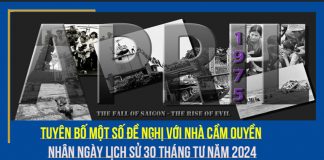




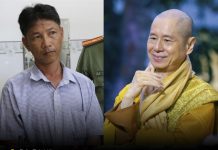




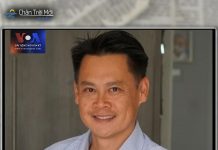

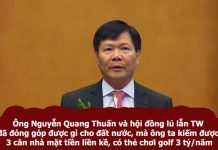


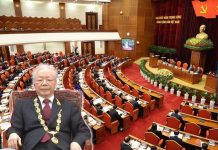
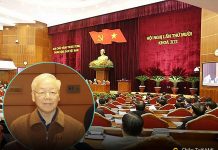
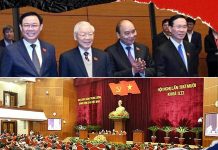















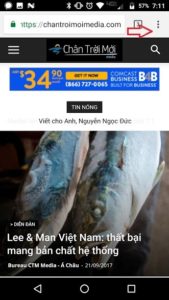

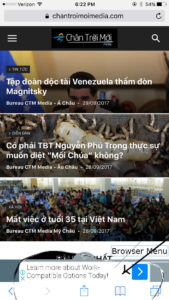 2/ Mở menu của Safari, nơi cuối màn hình, ô có mũi tên, kéo về phía trái cho đến khi thấy ô “Add to home screen”.
2/ Mở menu của Safari, nơi cuối màn hình, ô có mũi tên, kéo về phía trái cho đến khi thấy ô “Add to home screen”.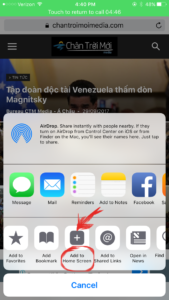 Bấm ô đó là xong. Bạn đã có icon ngay trên home screen như hình bên dưới.
Bấm ô đó là xong. Bạn đã có icon ngay trên home screen như hình bên dưới.